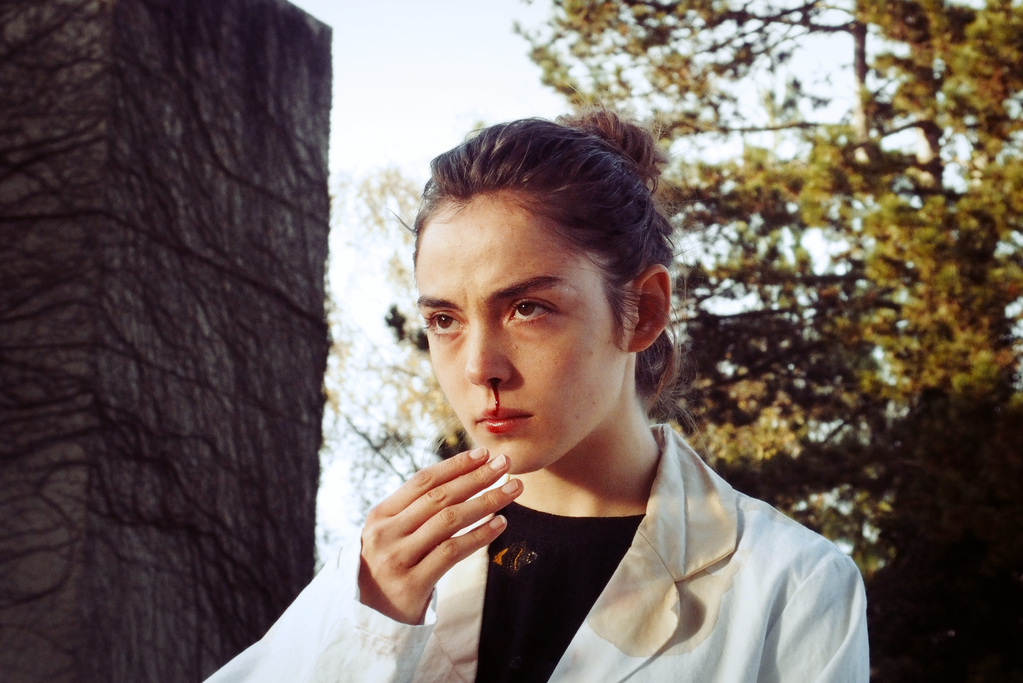RAW
 Monday, May 16, 2016 at 7:42AM
Monday, May 16, 2016 at 7:42AM Stars: Garance Marillier, Ella Rumpf, Rabah Nait Oufella, Laurent Lucas, Marion Verneux, Jean-Louis Sbille and Joana Preis.
Writer/Director: Julia Ducournau
Screened in Semaine de la Critique selection at 69th Festival de Cannes; reviewed at Olympia Cinemas 2, Cannes.
Rating: 4/5

While filmmakers and audiences tend to gag at the thought of ‘the other C-word’ onscreen, writer/director Julia Ducournau and her fearless leading lady Garance Marillier launch themselves teeth first into their bloody and occasionally brilliant cannibal horror pic, Raw (aka Grave, to its homeland Euro auds).
Blood ties and the inflamed passion of a woman’s blossoming are central to the French director’s strikingly accomplished first feature, one of the most invigorating debuts in recent memory. A coming-of-age tale conveyed with deftly handled emotional complexity and chilling thematic subtext, Raw is above all else a gut twisting work of classic body horror. On one occasion, your seasoned scribe averted his eyes in anticipation of what was about to unfold; there were a couple of other times when he wished he had.
In almost every frame is teen actress Garance Marillier as Justine, a committed vegetarian(!) who we meet as she is being delivered by her parents (Laurent Lucas, Joana Preis) to veterinary college. From the first night, senior students haze and harass the newbies; Justine is cut no slack by her big sister Alexia (Ella Rumpf), who so fervently adheres to university tradition she makes Justine eat raw rabbit kidney instead of being shamed before her peers.
Justine’s despair at eating flesh manifests in scaly, itchy skin; in one excrutiating but brilliantly sound-designed sequence, she works her nails deep into the red patches that have formed. Worse is yet to come, however, as the hunger for raw meat becomes an all-consuming need for Justine, her ravenous desires of every kind escalating to predatory proportions.
Such developments would be sufficient for many lesser works, but Ducornau taps a rich vein of sibling rivalry drama and familial intrigue that elevates the stakes and pits Marillier against the ferocity of Ella Rumpf’s Alexia. There are corpulent detours and the odd surreal touch along the way, but nothing derails the foreboding menace and driving dramatic pulse of the story; the denouement, a shocking sequence that plays like a real-world nightmare, and icky coda will induce a goosepimply bout of the cold sweats.
Raw is a film that both embraces and defies cinematic traditions. The sublime camerawork of DOP Ruben Impens (The Broken Circle Breakdown, 2013; The Sky Above Us, 2015) enhances the narrative while also subverting the genre; coming-of-age loveliness can turn to animalistic rage from one frame to the next. Other major assets include co-star Rabah Nait Oufella as coarse but caring gay roommate Adrien; the dizzying music score by Jim Williams (Sightseers, 2012; Kill List, 2011); and, of course, the precise and often sickening work done by the make-up effects units led by Olivier Alfonso and Laura Ozier. Julia Ducournau’s command of the production and assured guidance in the pursuit of her harrowing, unforgettable vision signifies the director as a new major talent.
 Coming-of-Age,
Coming-of-Age,  French Cinema,
French Cinema,  cannibalism,
cannibalism,  horror
horror 
